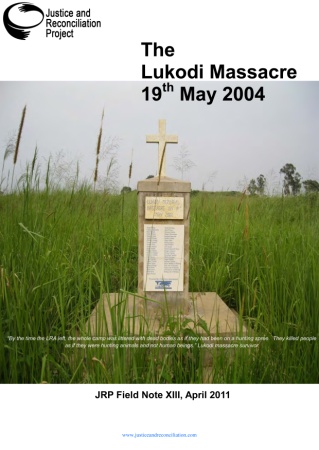
On the 19th of May 2004, the Lord’s Resistance Army (LRA) raided the village of Lukodi, and carried out a massacre that led to the death of over sixty people. Lukodi village is located seventeen kilometers north of Gulu town, in Gulu district. It is one of the many villages in northern Uganda that suffered from persistent LRA attacks, leading to the death of several people. Northern Uganda has been under conflict for over twenty years, as a result of a civil war waged mainly between the rebels of the LRA and the Government of Uganda (GoU). The impacts of the conflict have been devastating, characterized by the displacement of over 1.8 million people into IDP camps, loss of lives, and abduction of over 38,000 children by the LRA to serve as child soldiers and sex slaves.1 Lukodi, like many other villages in northern Uganda, was severely affected by the conflict, leading to the displacement of the inhabitants of the village who were forced to seek refuge in the congested camp of Coope2 for three years. The people of Lukodi were able to begin returning to their homes as a result of the relative peace which ensued in northern Uganda after the conclusion of the Juba peace talks in November 2008.
This report reconstructs a narrative of the Lukodi massacre and the major events that unfolded on that fateful day of 19th May 2004. The documentation centered on learning the experiences of this community prior to and during the massacre, the impact the massacre had on the population and the transitional justice challenges they continue to face today. It tells the story of a people that suffered from a horrible attack on their village in 2004, and were subsequently displaced for almost three years. It further looks at the current reintegration challenges faced by the people of Lukodi, now that the people are returning from displacement and trying to rebuild their lives, but in the process have to struggle with daunting resettlement challenges, in addition to complex questions on how to approach issues of reconciliation between victims and alleged perpetrators within the community. Many war affected communities in northern Uganda are faced with a similar scenario as they struggle to pick up the pieces of their lives in the wake of the conflict, characterized by difficulty to cope with their trauma, and challenges in the pursuit of their justice and reconciliation needs, specifically the need for accountability and reparations.
This report also briefly reflects on the visit and investigation carried out by the International Criminal Court (ICC) in Lukodi. As revealed by respondents, the Office of the Chief Prosecutor and the Ugandan Police visited Lukodi several times in the wake of the massacre, with the aim of gathering evidence for the case against the LRA. The report shows that, however well intended this intervention may have been, it has failed to serve the justice needs of the people in Lukodi. Rather than providing them with a solution, the ICC intervention has left the victims with more questions than answers regarding how to approach the question of accountability for perpetrators. Giving the victims a voice, this report therefore makes suggestions to the policy makers, practitioners and other stakeholders on how to address accountability issues using more appropriate means.
The report finally concludes with recommendations to the Government of Uganda and other stakeholders, in line with views and opinions gathered from the people of Lukodi. The people of Lukodi call for reparations, sharing of the findings of the official investigations carried out after the massacre, support for community reconciliation initiatives and a truth-telling process in which the community, the LRA and the Government of Uganda will take part. These views are shared by many war affected people all over northern Uganda, and therefore require the attention of the stakeholders in question.
To access the report, click here.

One thought on “The Lukodi Massacre: 19th May 2004, FNXIII”
Comments are closed.